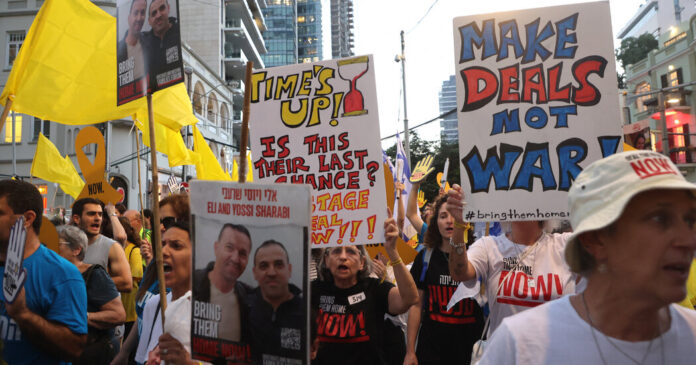Iran is expected to delay planned reprisals against Israel for the assassination of a top Hamas leader in Tehran to allow mediators time to make a high-stakes push for a cease-fire to end the war in Gaza, U.S., Iranian and Israeli officials said on Friday.
Top American, Israeli, Egyptian, and Qatari officials met in Doha, the Qatari capital, for a second day of talks on Friday in an attempt to resolve remaining gaps between Israel and Hamas. As those talks concluded, a joint statement from the United States, Egypt and Qatar said a “bridging proposal” had been presented to both parties. Senior officials from those three governments are expected to reconvene in Cairo before the end of next week.
It was not immediately clear if this timeline would change Iran’s assessments.
For more than two weeks, the region has anxiously awaited Iranian-led retaliation for the assassination of Ismail Haniyeh, the leader of Hamas’s political branch, and Fuad Shukr, a top commander in Hezbollah, the Lebanese armed group backed by Iran. Iran and Hezbollah have both vowed revenge, raising fears of regional all-out war.
After the first day of talks ended on Thursday night, Mohammed bin Abdulrahman Al Thani, the Qatari prime minister, called the acting Iranian foreign minister, Ali Bagheri Kani. Mr. Al Thani encouraged Iran to refrain from any escalation given the cease-fire talks in Doha, according to two Iranian officials and three other officials familiar with the call, who spoke on condition of anonymity because they were not authorized to speak publicly.
By Friday, Israeli intelligence had assessed that Hezbollah and Iran had lowered the level of alertness in their rocket and missile units, according to five Israeli officials. Israel now believes the Iranian-led response — already apparently delayed several times — will take place at a later date, the officials said. The officials have cautioned that their assessments are rapidly changing given the fluidity of events. Intelligence has been sparse and changes frequently, and Iran and Hezbollah are known to be constantly assessing the situation.
Fears of a wider regional conflict threaten to compound the devastation caused by Israel’s offensive in Gaza, which has killed tens of thousands of Palestinians and destroyed large swaths of the enclave. Israel launched the war after Hamas carried out an expansive surprise attack on southern Israel that killed roughly 1,200 people and saw 250 others abducted to Gaza, according to the Israeli authorities.
Israel and Hamas have been negotiating on and off for months over a three-phase cease-fire deal which would see the gradual release of the remaining 115 living and dead hostages held in Gaza for Palestinian prisoners. Under the terms of the deal, Israel would withdraw forces from Gaza and both sides would ultimately reach a permanent truce.
Several key points of contention between Israel and Hamas remain unresolved despite repeated rounds of talks.
Hamas refused to participate in the latest round of deliberations, which it labeled a delaying tactic by Benjamin Netanyahu, the Israeli prime minister. But Hamas officials had voiced willingness to speak with mediators if significant progress was made in the summit, according to officials familiar with the matter.
Mr. Netanyahu has stiffened Israel’s terms for an agreement in recent weeks, including calling for Israeli troops to remain on the Gazan side of its border with Egypt to prevent Hamas from rearming itself.
Over the past few days, Western diplomats have repeatedly shuttled across the region in an attempt to head off the anticipated escalation between Israel and Iran.
On Friday, the British and French foreign ministers arrived in Israel to discuss the ongoing cease-fire talks, as well as attempts to avoid all-out war between Israel and Hezbollah. And Egypt’s foreign minister, Badr Abdelatty, who met with Lebanese officials in Beirut on Friday, said that a cease-fire in Gaza was “the basis for stopping the escalation” in the region, according to Lebanese state-run media.
On Friday, the Israeli prime minister’s office said that the U.S. secretary of state, Antony J. Blinken, was expected to meet with Mr. Netanyahu in Israel on Monday.
Aaron Boxerman contributed reporting from Jerusalem and Euan Ward from Beirut.
Read More: Iran Expected to Delay Retaliation Over Killing of Hamas Leader, Officials Say


